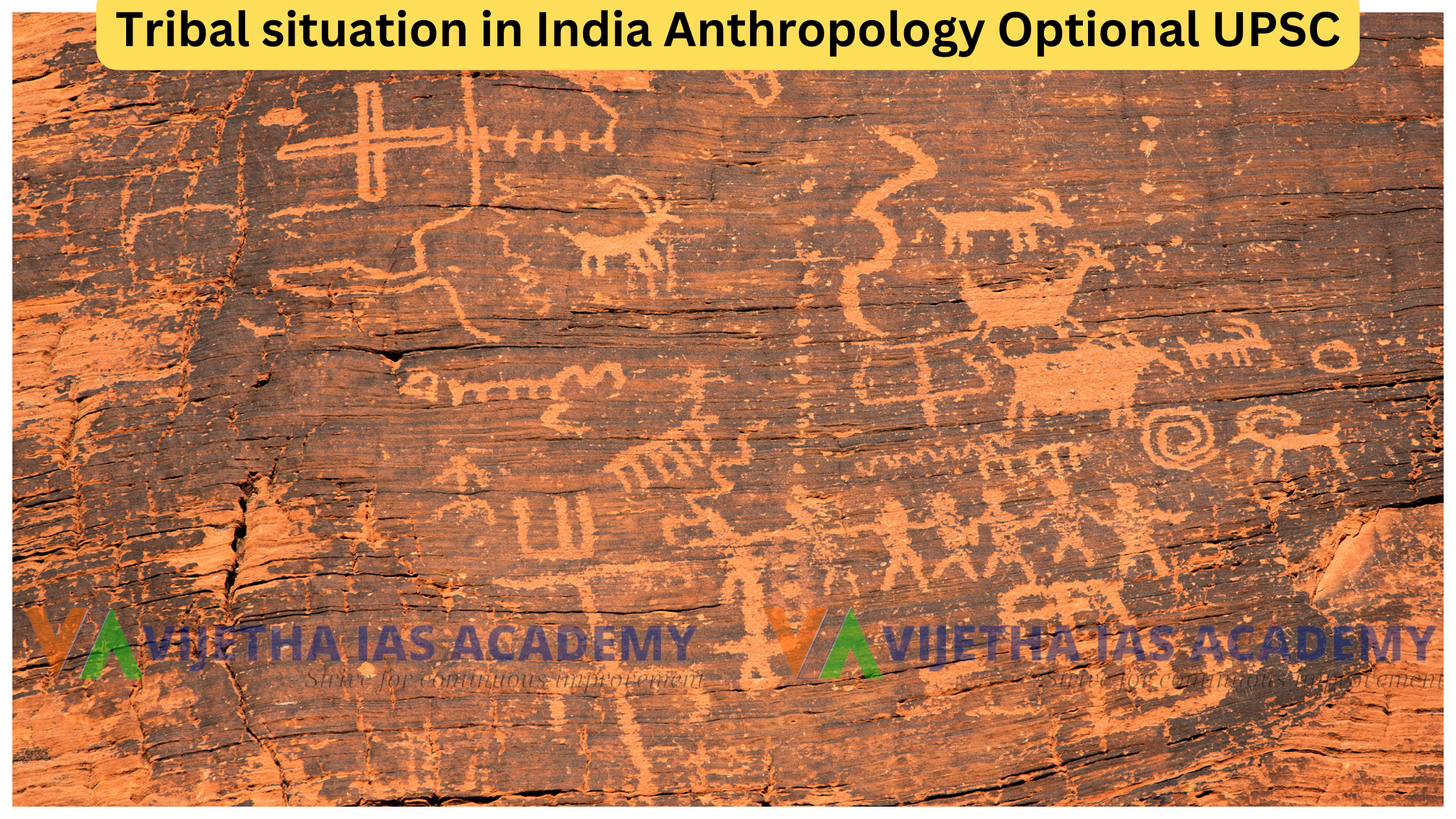
Tribal Situation in India: Anthropology Optional UPSC
India is home to a rich tapestry of diverse cultures and communities, among which tribal groups hold a unique place. Understanding the tribal situation in India is crucial for UPSC aspirants, especially those opting for Anthropology as their optional subject. This blog delves into the current tribal situation in India, its relevance in the UPSC syllabus, and the role of Vijetha IAS Academy and Kishore sir in guiding aspirants to excel in this domain.
The Tribal Scenario in India
India’s tribal population is one of the largest in the world, comprising over 700 distinct tribes spread across the country. These tribes, officially recognized as Scheduled Tribes (STs), are characterized by their unique cultures, languages, and social structures. However, they also face significant challenges in terms of socio-economic development, political representation, and cultural preservation.
Demographic Overview
According to the 2011 Census, Scheduled Tribes constitute about 8.6% of India’s total population, which translates to over 104 million people. The majority of the tribal population is concentrated in the states of Madhya Pradesh, Maharashtra, Odisha, Rajasthan, Gujarat, Chhattisgarh, Jharkhand, and Andhra Pradesh. Tribal communities are also found in significant numbers in the northeastern states, where they form the majority population.
Socio-Economic Challenges
Tribal communities in India face a range of socio-economic challenges:
-
Poverty: A significant proportion of the tribal population lives below the poverty line, with limited access to basic amenities such as healthcare, education, and clean drinking water.
-
Education: Literacy rates among tribal communities are lower compared to the national average. This is due to a lack of educational infrastructure, language barriers, and socio-economic constraints.
-
Healthcare: Tribes often have limited access to healthcare services, resulting in higher rates of malnutrition, infant mortality, and disease prevalence.
-
Land and Livelihoods: Tribals traditionally depend on land and forest resources for their livelihoods. However, displacement due to development projects, mining, and deforestation has disrupted their traditional ways of life.
-
Social Exclusion: Tribals often face social discrimination and exclusion, which exacerbates their marginalization and hampers their integration into mainstream society.
Political Representation
While the Indian Constitution provides for political representation of Scheduled Tribes through reserved seats in Parliament and state legislatures, the effectiveness of this representation varies. Many tribal areas still lack adequate political voice and influence, leading to insufficient attention to their issues and needs.
Cultural Preservation
The cultural heritage of tribal communities is rich and diverse, encompassing unique languages, traditions, art forms, and rituals. However, modernization, cultural assimilation, and economic pressures pose threats to the preservation of this heritage. Efforts are needed to safeguard and promote tribal cultures while integrating them into the broader national fabric.
Relevance in UPSC Anthropology Optional
Understanding the tribal situation in India is a crucial part of the Anthropology optional syllabus for UPSC. Key topics include:
- Tribal communities in India
- Social structure and cultural patterns of tribes
- Issues of tribal identity and integration
- Policies and programs for tribal development
- Tribal movements and resistance
Aspirants need to grasp these topics comprehensively to effectively address questions related to tribal anthropology in the examination. This is where specialized coaching and expert guidance become invaluable.
Role of Vijetha IAS Academy and Kishore Sir in Anthropology Preparation
For aspirants aiming to excel in Anthropology optional, Vijetha IAS Academy offers comprehensive coaching that covers the entire syllabus systematically.
Vijetha IAS Academy
The academy’s structured approach includes detailed lectures, high-quality study materials, regular tests, and personalized feedback. Their focus on current developments and integration into the syllabus helps students stay updated and relevant.
Kishore Sir Anthropology
Kishore sir, a distinguished faculty member at Vijetha IAS Academy, is renowned for his expertise in Anthropology. His deep understanding of tribal anthropology and ability to simplify complex topics have made him a favorite among UPSC aspirants.
Kishore sir’s classes on the tribal situation in India are particularly noteworthy. He delves into the socio-economic, political, and cultural aspects of tribal communities, providing students with a comprehensive understanding. His practical approach, including interactive sessions, case studies, and real-world examples, helps students connect theoretical knowledge with practical applications.
Strategies for Success in Anthropology Optional
To excel in Anthropology with a focus on the tribal situation, aspirants should adopt a strategic approach:
-
Comprehensive Understanding: Develop a thorough understanding of the syllabus, focusing on key topics related to tribal communities.
-
Quality Resources: Utilize standard textbooks, research papers, and study materials provided by reputed coaching institutes like Vijetha IAS Academy.
-
Regular Revision: Make concise notes and revise regularly to retain concepts. Regular revision is crucial for mastering the subject.
-
Answer Writing Practice: Practice writing answers to previous years’ questions and mock tests. Focus on structuring your answers logically and incorporating relevant examples.
-
Stay Updated: Keep abreast of current developments, government policies, and socio-cultural issues related to tribal communities. Integrating current affairs into your answers will enhance their relevance.
Conclusion
The tribal situation in India is a vital component of anthropology, offering deep insights into the diverse and dynamic nature of Indian society. For UPSC aspirants, mastering this topic is essential for scoring well in the Anthropology optional paper. With expert guidance from institutions like Vijetha IAS Academy and seasoned educators like Kishore sir, candidates can develop a comprehensive understanding and strategic approach to excel in the examination.
Understanding the complexities of tribal life not only helps in scoring high marks but also enriches one’s perspective on the challenges and opportunities faced by these communities. As aspirants prepare for the UPSC journey, the knowledge gained from this study will serve them well in their roles as future administrators, contributing to the nation’s inclusive growth and development.
